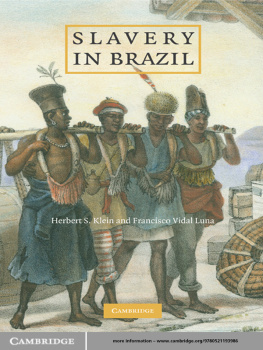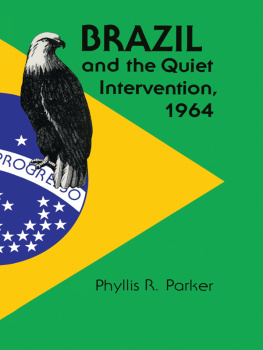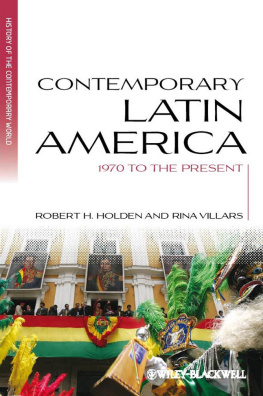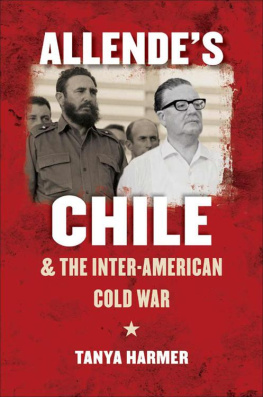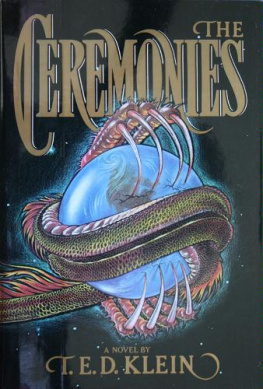Klein Herbert S. - Brazil 1964-1985: the military regims of Latin America in the cold war
Here you can read online Klein Herbert S. - Brazil 1964-1985: the military regims of Latin America in the cold war full text of the book (entire story) in english for free. Download pdf and epub, get meaning, cover and reviews about this ebook. City: London;New Haven, year: 2017;2016, publisher: Yale University Press, genre: Politics. Description of the work, (preface) as well as reviews are available. Best literature library LitArk.com created for fans of good reading and offers a wide selection of genres:
Romance novel
Science fiction
Adventure
Detective
Science
History
Home and family
Prose
Art
Politics
Computer
Non-fiction
Religion
Business
Children
Humor
Choose a favorite category and find really read worthwhile books. Enjoy immersion in the world of imagination, feel the emotions of the characters or learn something new for yourself, make an fascinating discovery.

- Book:Brazil 1964-1985: the military regims of Latin America in the cold war
- Author:
- Publisher:Yale University Press
- Genre:
- Year:2017;2016
- City:London;New Haven
- Rating:3 / 5
- Favourites:Add to favourites
- Your mark:
- 60
- 1
- 2
- 3
- 4
- 5
Brazil 1964-1985: the military regims of Latin America in the cold war: summary, description and annotation
We offer to read an annotation, description, summary or preface (depends on what the author of the book "Brazil 1964-1985: the military regims of Latin America in the cold war" wrote himself). If you haven't found the necessary information about the book — write in the comments, we will try to find it.
Brazil 1964-1985: the military regims of Latin America in the cold war — read online for free the complete book (whole text) full work
Below is the text of the book, divided by pages. System saving the place of the last page read, allows you to conveniently read the book "Brazil 1964-1985: the military regims of Latin America in the cold war" online for free, without having to search again every time where you left off. Put a bookmark, and you can go to the page where you finished reading at any time.
Font size:
Interval:
Bookmark:
BRAZIL, 19641985
THE YALE-HOOVER SERIES ON AUTHORITARIAN REGIMES
BRAZIL, 19641985
THE MILITARY REGIMES OF LATIN AMERICA IN THE COLD WAR
HERBERT S. KLEIN AND
FRANCISCO VIDAL LUNA
HOOVER INSTITUTION
STANFORD UNIVERSITY
STANFORD, CALIFORNIA
Yale UNIVERSITY PRESS
New Haven and London
Copyright 2017 by Yale University and the Board of Trustees of the
Leland Stanford Jr. University.
All rights reserved.
This book may not be reproduced, in whole or in part, including illustrations, in any form (beyond that copying permitted by Sections 107 and 108 of the U.S. Copyright Law and except by reviewers for the public press), without written permission from the publishers.
Yale University Press books may be purchased in quantity for educational, business, or promotional use. For information, please e-mail (U.K. office).
Set in Sabon type by Newgen North America.
Printed in the United States of America.
ISBN 978-0-300-22331-6
Library of Congress Control Number: 2016951587
A catalogue record for this book is available from the British Library.
This paper meets the requirements of ANSI/NISO Z39.48-1992 (Permanence of Paper).
10 9 8 7 6 5 4 3 2 1
In Memory
of Francisco Vidal Ibaez
que lutou contra Franco na guerra civil espanhola
&
of Tomas E. Skidmore
Contents
Introduction
THE TWENTY YEARS from the 1960s to the 1980s were among the most bitter and difficult periods in Latin American history. The progressive overthrow of one democratic regime after another by national military establishments led to the collapse of democratic rule throughout much of the hemisphere. Previously long-term stable democratic societies succumbed to authoritarian military regimes, which often used violence against their citizens on an unprecedented scale. Thought was controlled, opponents were killed or exiled, and fear became the cement that kept most of these regimes in power. All of this occurred in the context of the Cold War, the long postwar international conflict between the United States and the Soviet Union, which led the United States, especially after the Cuban Revolution of 1959, to support many of these authoritarian governments.
But just as there were different preexisting democratic states, there were different styles of military regimes that emerged in this period. Some led to dictatorships of one-man rule, as in the case of Chile, and others guaranteed that such a dictatorship would not be the norm, either because of institutional instability in the army or because the army itself was powerful enough to maintain the institution above the demands of any particular individual. In the first case, typified by the Bolivian experience, this led to constant regime change under competing military officers. In the second, as in Brazil, Uruguay, and Peru, it led to orderly transitions that mimicked democratic presidential terms.
Moreover, not all regimes had the same ideology. Some, like Argentina, were primarily repressive states with little interest in promoting an economic or social agenda, while others were bent on restructuring their societies in a profoundly new way, as was the case with Peru, Brazil, and Chile. For all their hostility to previous democratic governments, some of these regimes continued to develop earlier institutions and programs of the overthrown democratic states and can be seen as a continuum of previous eras. Although anticommunism and fear of popular mobilization were common motivations in all these regimes, how to deal with demands for social and economic change differed among Latin American authoritarian governments. Some were totally repressive and hoped that the opposition could be simply liquidated and never return. Others tried divide and rule, as in Bolivia, whose military used peasant unions to put down miner unions and the urban Marxist parties. Others, such as leaders in the military government in Peru and Brazil, tried to modernize their societies and resolve social, economic, and class conflicts by forcing through basic reforms from above. They in essence tried to anticipate potential radical movements by providing land reform, or creating a modern social welfare system, or even by completely reorganizing the state and the economy in the name of a new definition of the state and the economy. But even in these reformist states there were major differences among the types of regimes that adopted authoritarian developmentalist models. Some primarily emphasized the takeover by the state of the economy; others applied a mix of private and public capital; while still others adopted radical neoliberal models and rejected the role of the state in education and the economy and even in the provision of social welfare.
In the case of the Peruvian, Brazilian, and Chilean military governments, many of the programs and reforms initiated by these regimes would survive and become part of the basic post-military democratic governmental structure. On the other hand, the overthrow of the Argentine and Uruguayan military regimes left few positive changes that the post-military democratic governments could adopt. But the state violence unleashed by the military in this period also had important unintended consequences that would lead to profound changes in the post-military era. Except for the Peruvians, all of these military regimes used state terror to control their populations, which resulted in a long and bloody history of torture and killings. It was this extraordinary violence of the military era and the bitter defeat of armed revolutionary movements of the period that profoundly changed the entire ideology of the democratic political world in Latin America after 1990. For the parties of the center and the left, human rights became a fundamental part of democratic politics. In many post-military regimes, this led to multiparty coalitions of the center-left, which eventually brought the left back to power in most of these countries, sometimes even with the old guerrilla leaders becoming president. It also convinced the civilian right-wing parties that calling in the military for support could only lead to disaster. Thus, in virtually all of the major South American states that experienced military regimes, one of the most important results of the military era was the emergence of a renewed and more powerful democratic state in the region, something most of these regimes did not anticipate or wish to occur.
In this volume we both survey and compare the experience of the major military regimes of South America in the period of the Cold War, from their origins and evolution to their final conclusions. We have selected these regimes because they were more independent of North American influence than the states of the Caribbean and Central America, which experienced a nonending North American influence that rendered their regimes far less stable both before and after the military era of the 1960s to the 1980s. In fact, for all their violence and constant cross-border invasions of dissidents and rebels, with the exception of Guatemala, they offer no real comparison to the experience of the significant South American countries.
How all these major regimes evolved is best seen from the experience of one such state. For this we have selected for more detailed study the Brazilian military governments of the period 196485. In this in-depth analysis we concentrate on the political, economic, and social evolution of this regime, which had a profound impact on modern Brazilian developments. We also try to situate this Brazilian experience in the context of the other South American countries that passed through this extraordinary period in the history of the continent.
Next pageFont size:
Interval:
Bookmark:
Similar books «Brazil 1964-1985: the military regims of Latin America in the cold war»
Look at similar books to Brazil 1964-1985: the military regims of Latin America in the cold war. We have selected literature similar in name and meaning in the hope of providing readers with more options to find new, interesting, not yet read works.
Discussion, reviews of the book Brazil 1964-1985: the military regims of Latin America in the cold war and just readers' own opinions. Leave your comments, write what you think about the work, its meaning or the main characters. Specify what exactly you liked and what you didn't like, and why you think so.

